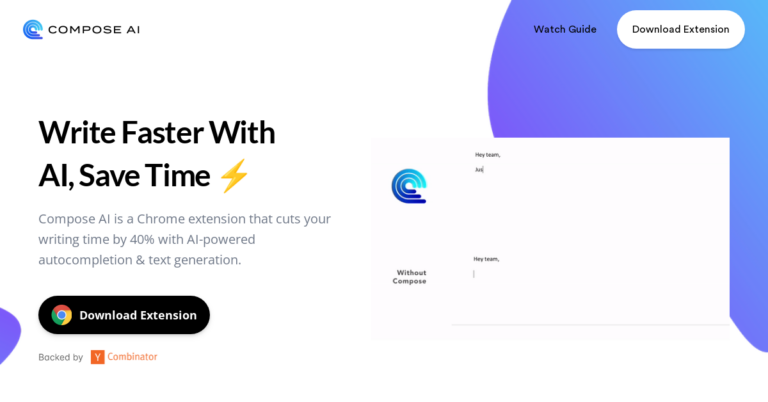Summary:
Artificial Intelligence (AI) tools can revolutionize the way you work, and this comprehensive guide will show you how. From streamlining processes to unlocking new insights, AI tools can help businesses of all sizes improve their productivity and efficiency. In this guide, we’ll explore the benefits of AI and provide practical tips on how to integrate AI tools into your workflow.
Table of Contents:
– Introduction
– Benefits of AI
– AI Tools for Streamlining Processes
– AI Tools for Data Analysis
– AI Tools for Customer Service
– AI Tools for Marketing
– Challenges of Implementing AI
– How to Successfully Implement AI
– Conclusion
Introduction:
Artificial Intelligence is revolutionizing the way we work and live, and its impact on businesses cannot be overstated. AI can automate repetitive tasks, analyze data faster than humans, and provide insights that were previously impossible to uncover. By leveraging AI tools, businesses can streamline their processes, improve their customer service, and gain a competitive edge. However, implementing AI can be challenging, and it’s important to understand the benefits and challenges before integrating AI tools into your workflow.
Benefits of AI:
The benefits of AI are numerous, and they vary depending on the specific tool and application. However, some of the most common benefits of AI include:
– Increased efficiency and productivity: AI can automate repetitive tasks and free up time for employees to focus on more complex tasks.
– Improved accuracy: AI tools can analyze data faster and more accurately than humans, reducing errors and improving decision-making.
– New insights: AI can uncover patterns and insights that were previously impossible to find, providing businesses with new opportunities to innovate and improve.
– Better customer service: AI tools can improve customer service by providing faster response times, personalized recommendations, and 24/7 support.
AI Tools for Streamlining Processes:
One of the most popular applications of AI is process automation. AI tools can automate repetitive tasks, such as data entry or document processing, freeing up time for employees to focus on more complex tasks. Some popular AI tools for process automation include:
– Robotic Process Automation (RPA): RPA uses software robots to automate repetitive tasks, such as data entry or document processing.
– Workflow Automation: Workflow automation uses AI to automate a series of tasks and processes, such as sending out reminders or notifications.
– Chatbots: Chatbots can automate customer service tasks, such as answering frequently asked questions or processing orders.
AI Tools for Data Analysis:
Data analysis is another area where AI can provide significant benefits. AI tools can analyze large amounts of data faster and more accurately than humans, providing insights that were previously impossible to uncover. Some popular AI tools for data analysis include:
– Machine Learning: Machine learning algorithms can analyze large data sets and identify patterns and trends, providing businesses with insights into customer behavior or market trends.
– Predictive Analytics: Predictive analytics uses AI to analyze historical data and make predictions about future trends or events.
– Natural Language Processing (NLP): NLP uses AI to analyze and understand human language, providing businesses with insights into customer sentiment or feedback.
AI Tools for Customer Service:
AI tools can also improve customer service by providing faster response times, personalized recommendations, and 24/7 support. Some popular AI tools for customer service include:
– Chatbots: Chatbots can provide 24/7 support and answer frequently asked questions, freeing up time for customer service representatives to focus on more complex issues.
– Voice Assistants: Voice assistants can provide personalized recommendations and help customers navigate complex processes, such as booking a flight or making a reservation.
– Sentiment Analysis: Sentiment analysis uses AI to analyze customer feedback and sentiment, providing businesses with insights into customer satisfaction and areas for improvement.
AI Tools for Marketing:
Finally, AI can also improve marketing efforts by providing insights into customer behavior and preferences. Some popular AI tools for marketing include:
– Predictive Analytics: Predictive analytics can identify customer preferences and behavior, allowing businesses to tailor their marketing efforts to specific segments.
– Recommendation Engines: Recommendation engines can provide personalized recommendations to customers, increasing engagement and conversion rates.
– Content Optimization: Content optimization uses AI to analyze and optimize content, such as headlines or images, for maximum engagement and impact.
Challenges of Implementing AI:
While the benefits of AI are numerous, implementing AI can be challenging. Some of the most common challenges include:
– Data Quality: AI tools rely on high-quality data to provide accurate insights, so it’s important to ensure that your data is clean and accurate.
– Integration: Integrating AI tools into your existing workflow can be challenging, so it’s important to have a clear plan and strategy in place.
– Security: AI tools can pose security risks, so it’s important to ensure that your data is secure and that your AI tools are compliant with relevant regulations.
How to Successfully Implement AI:
To successfully implement AI, it’s important to have a clear plan and strategy in place. Some tips for successful implementation include:
– Start small: Start with a small pilot project to test the effectiveness of AI tools and identify any potential challenges.
– Involve stakeholders: Involve stakeholders from across your organization to ensure that AI tools are aligned with your overall business goals and strategy.
– Invest in training: Invest in training and education to ensure that your employees have the skills and knowledge to effectively use AI tools.
Conclusion:
AI tools can revolutionize the way you work, providing benefits such as increased efficiency, improved accuracy, and new insights. By leveraging AI tools for process automation, data analysis, customer service, and marketing, businesses can streamline their operations and gain a competitive edge. However, implementing AI can be challenging, and it’s important to have a clear plan and strategy in place to ensure success. With the right tools and approach, AI can transform the way you work and drive growth and success for your business.
Resources:
– Forbes: Top 10 AI Tools for Business in 2021
– Harvard Business Review: How to Implement AI in Your Business
– MIT Sloan Management Review: The Business of Artificial Intelligence
– McKinsey & Company: How Companies Are Using AI to Boost Customer Experience
#Revolutionizing #Workflow #Tools #Comprehensive #Guide


